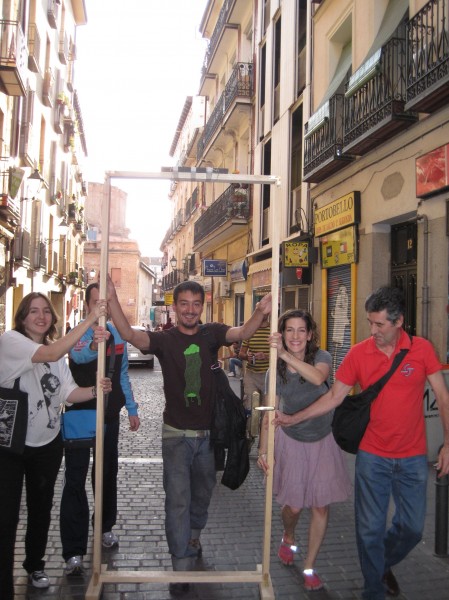Personal, Present and Immediate*:
Making Performance on Socio-Political
Questions
.
“One of the best courses I have taken
at the University of Michigan.”
–anonymous student evaluation
Loreto Ares, Miguel “Melo” Quintana, Joan Taipo-San, Eryn Rosenthal, and José Luís Cano Blanco in Tú Aquí, a chapter of The Doors Project. Doorframe design by Bea Velasco; construction at La Nave Trapecio,
La Tabacalera Cultural Center, Madrid. Additional thanks to: Cristhian Salazar, Cecilia Ruiloba, José Jerónimo,
Natalia Sánchez-Ton i Normand, and Jesús Escobar. Photo by Cecilia Ruiloba.
.
Personal, Present and Immediate*:
Making Performance on Socio-Political
Questions
WN’18, Tuesdays 2-5pm
Weekly film series on Thursdays 7pm, open to the public
University of Michigan
RCHUMS 334.007 / SW 513.003 / ARTSADMIN 506.002
Visiting Professor Eryn Rosenthal
Residential College Arts & Ideas in the Humanities Program
Global Theatre and Ethnic Studies Minor; Composition credit for Dance Minor
Cross-listing for graduate credit with The School of Social Work and The School of Music, Theatre and Dance’s Excellence in Entrepreneurship, Career Empowerment, and Leadership (EXCEL) Program
.
Course Description:
This composition workshop-style course is a generative laboratory to make rigorous, experimental works that open reflection on socio-political issues. Our seminar involves: a study of other artists’ work and ways they engage with wide-ranging political matter through performance, animation, sculpture and other media; an embodied exploration of compositional elements at different sites in the Residential College and U-M’s campus; and creative assignments that employ various methods to interrogate sociopolitical material of your own choosing. We’ll be examining the immediate, present, and personal relationship of the body to performance in a very expansive way, studying William Kentridge’s stop-gap animation, Diego Rivera’s Detroit Industry murals, and Maya Lin’s Vietnam Memorial, for example, alongside more traditional understandings of performance in theater, dance and film. Questioning assumptions of performance, genre, audience and politics will form an important part of our work in this interdisciplinary class, as will a detailed examination of compositional elements common to multiple art forms. We will gain practice and experience with different approaches to making performance and different ways to deploy compositional tools, depending on your objectives. No previous experience in performance or socio-political action necessary, and all bodies, abilities, and backgrounds are actively welcome on this journey; experimentation, adaptation and play with formats and tools that may be new to you will be encouraged. The course will culminate in a public showing of original student work.
Bio:
Choreographer Eryn Rosenthal examines the role of the body in transgressing previously legislated boundaries. Her ongoing series, The Doors Project, investigates transitions–political, social, intimate–through site-based performance in different doorways around the world. Eryn has worked with choreographer Sello Pesa, poet Elizabeth Alexander, and documentary theatre pioneer Anna Deavere Smith, and has performed and taught throughout the US, South Africa and Europe. Eryn holds a BA in Comparative Literature from Yale University and an MFA in Dance from the University of Michigan, where she also studied in the Ford School for Public Policy. She is delighted to be back at U-M as a 2017 King-Chávez-Parks Visiting Professor and Artist in Residence for Dialogue-Building, Diversity and Inclusion Initiatives, and the 2018 Visiting Artist at the Residential College. www.erynrosenthal.com
* “Personal, present and immediate”: From Murray v. Maryland (1935), one of the precedents to the Supreme Court case Brown v. Board of Education (1954).
